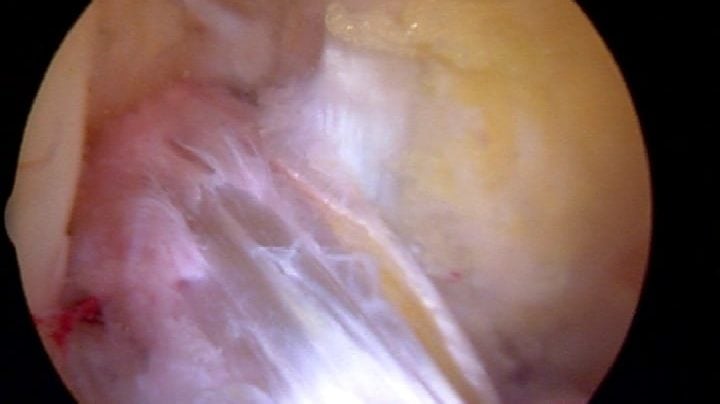
In Part I of our ACL Surgery blog series we discussed many issues pertaining to the ACL and Anterior Cruciate Ligament surgery. We touched on:
- What the ACL is.
- Why ACL tears occur.
- Whether or not you should consider ACL surgery.
- What choices you have for your ACL surgery.
After that, I left you with a number of questions to pose to your surgeon before signing on the dotted line and before proceeding. Certain things bear repeating. First and foremost. Volume matters! How many ACL reconstructions your surgeon performs in a year matters a great deal when considering whether or not they should be your surgeon. This is not a procedure one should dabble in.
Another very important subject was whether or not your surgeon performs an “anatomic” ACL reconstruction. ACL surgery today is not the same as it was just a few short years ago. Our understanding of the anatomy, physiology, function and rehabilitation of the ACL has changed dramatically. The actual ACL surgery procedure has changed as well. If the term anatomic reconstruction is foreign to your surgeon you should consider moving on.
ACL Surgery, Part II.
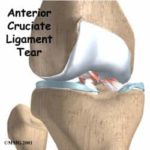
If you have gotten this far you have decided that a reconstruction of your ACL is in your best interest. Your knee is unstable or buckling. You are unhappy with your quality of life because of that. You had the choice to change your lifestyle to suit your knee … or change your knee to suit your lifestyle– and you chose the later.
What next?
Weeks before ACL Surgery…
~Prehabilitation… or getting the knee in shape for the surgery is very important. You want to have as little atrophy or loss of muscle mass as possible. You also want your range of motion to be restored following your injury, as little inflammation as possible and as little pain as possible before heading into the operating room. This is also a good time to learn how to use crutches.
~You may wish to invest in an “ice machine”.. or find out if your insurance covers it (good luck!).
~Set up your house/apartment. Getting around for the first week or so will be painful at best. Try to set up a little area where the bed and bath are close together, on the same floor and hopefully are near the kitchen too. Remove all area rugs, cords, chargers, etc, because you want to minimize the risk of falling when you come home. Set up a call bell… or some other means of asking for assistance.
~Starting a week before your ACL surgery starts, shower daily with an antibacterial soap. Do not shave your leg, and let your surgeon know if you develop a cut, bruise or bug bite anywhere around your knee. Do not forget to shower the morning of the surgery too… regardless of what time you need to be at the hospital. Please do not put any creams or moisturizers on your skin on the day of surgery.
~Does anyone in your family have a history of blood clots or a pulmonary embolus? Are you a smoker? Are you are birth control pills or testosterone? All of these are known risk factors for blood clot development. If you answered yes or maybe, let your surgeon know. Another testing might be necessary.
Stay ahead of the latest news regarding ACL Surgery by clicking here to receive our Sports Medicine Blog posts.
Day of your ACL Surgery:
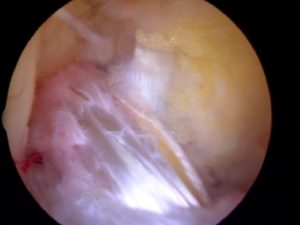
~Don’t forget to shower with an antibacterial soap.
~Put your initials on the leg to be operated on. You do not want to be a wrong-side surgery statistic.
~Have a nice talk with the anesthesiologist. Talk about a “block” to numb some of the nerves in the leg. This has little risk and helps ease the transition home after surgery.
~Once home… start taking your pain medications BEFORE the block wears off (12-18 hours). That will limit the pain that comes on quickly as the effect of the block starts to fade.
~Brace or no brace? Many surgeons use braces. But then again many surgeons own the braces and profit from them. A brace should not be needed following a routine reconstruction, but it never hurts to go with your surgeon’s recommendations.
~CPM or no CPM? A CPM machine moves your knee. Two decades ago everyone got them. The research is very clear. A CPM machine will not quicken your recovery. A CPM might increase the bleeding. And a CPM machine has little if any role in the success of your ACL procedure.
After your ACL Surgery …
Welcome home…
~Recent literature shows that there may be a higher incidence of blood clots in the leg following surgery than we previously thought. Some physicians are starting to recommend routine prophylaxis or prevention strategies to minimize the risk. It is IMPOSSIBLE to prevent all blood clots, but early motion, calf pumps, aspirin, and other agents can decrease the risk. Some medications used to decrease the risk of blood clots increase your risk of bleeding… so… Talk to your surgeon about this.
~Keep your ankles moving up and down all the time… squeeze your quads and stay as active as possible. This is the best prevention strategy against blood clots.
~Ice is your best friend. Use it often, but do not let the ice bag, bag of peas or ice machine sit directly against your skin.
~Motion. Motion is life. Our joints like to move. Discuss this with your surgeon first… but most of us will encourage you to move your knee as much as you tolerate. It is very hard to damage your new ligament if it was put in well. In some instances we will limit a person’s motion after surgery, so make sure you check with your surgeon first.
~Physical therapy becomes an important aspect of your recovery. As you near your return to sports date it is far more important… but nonetheless, getting back your motion and flexibility without putting your knee at risk usually requires the assistance of a professional. Find a therapist who is well versed in the rehabilitation of ACL reconstructions in particular.



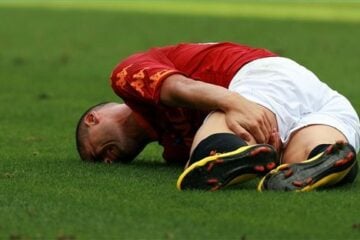
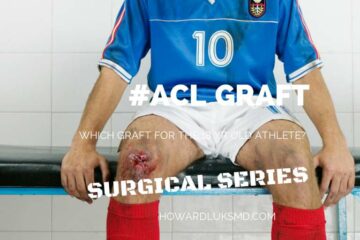
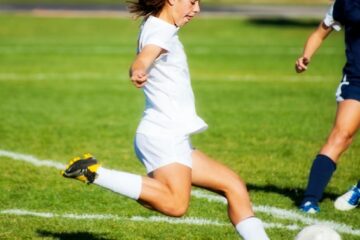








Hi doctor, I’m preparing for my surgery and your posts have been quite useful. I wanted to ask you about the time between the injury and surgery, in my case the MRI showed a swollen bone near the broken ligament, my doctor suggested waiting at least 2 months to do the surgery, is that OK? A month has passed and I already recovered full motion, obviously I feel like doing the surgery as soon as possible.
Hi Luis… Thank you very much for you kind words. Once you motion, flexibility and mechanics have returned it is usually safe to proceed.
Good Luck
Howard Luks
Thank you for your clear information and comments. I’m a retired PE teacher and devoted equestrian (73, female) facing possible knee procedures, I have always maintained my own horses and quitting riding is unthinkable When I tell this to examining surgeons, they don’t offer offer much advice regarding which implant to consider but several riding friends have had success with Stryker implants.
the implant is less important than how well it is put in. I good doc and a motivated patient make a good team.
Hi Dr. I tore my ACL in Nov and planning have it reconstructed by June, My doctor told me that he will have my leg fully extended for 2 weeks before I can bend it. For him, it more important that it can be fully extended that percentage in bending….. Is that ok? Thanks
It is true that gaining back extension is very important. But it is unusual to have to immobilize a knee after an ACL reconstruction. There are many downsides to immobilization.
Hi doctor howard acctually today is the day 56th of my acl and grade ii posterior horn literal and medial meniscus surgery i walk n0rmaly alsm0st 80% but the problem is that when i loose my muscel and when i push my tebia my tebia is going farward from the famur i feel laxity in my knee as before the surgery but my ortho surgeon said every thing is n0rmal dont wory i am n0t going for physicl rehabilitation because here is n0 p.t availble i am doing exercise phn h0me and i can band my knee up to 135 degree.
time for another opinion
Hi doc.. I had my arthroscopic acl surgery done using semitendinosus autograft 15days before… The following were the results from my Mri 1.high grade tear of acl with interstitial edema 2.partial tear of patellar attachment site of medial patellofemoral ligament 3 . grade 2tear of femoral attachment site of lcl…. Pre op and post op, am experiencing stiffness and pain in lcl region is it normal? . I was so afraid before the surgery that I did not even research about it… Been searching for this all over the net and couldn’t find a proper answer… I would be glad if I could get a help.. Tnx in advance :)
Not a routine ACL tear. You had a big injury my friend… will need a lot of time and care to get your motion and function back. Hopefully your lateral side is stable ??
HJL
Yep doctor I think so… But during flexion I m experiencing somewhat a little more pain and stiffness in lcl region rather than operated acl region.. I guess the maximum flexion I can reach is uh.. My leg and my thigh is at 90degree to each other maybe or maybe more..I havr to wait for a week for my doctor’s appointment.. My doctor didn’t mention about icing too.. Should I apply ice? Tnx doctor…